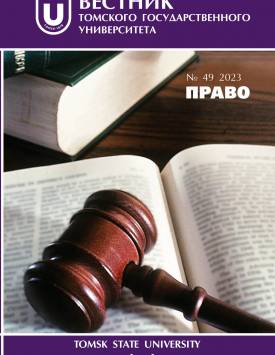Cooperative compliance as an innovative model of tax administration: general concept, problems, advantages and universal features
The Cooperative compliance model was developed by the OECD as a response to the problems of aggressive tax planning by large corporations. Cooperative compliance is a way of working proactively with taxpayers to ensure that information, taxes and fees are determined as correctly and as early in the taxation process as possible. The functional and intended purpose of cooperative compliance is to move away from hostility between participants in tax interactions, to establish closer cooperative relationships and to better balance the interests of tax authorities with those of large organisations. This, in turn, should lead to greater transparency and tax compliance for large businesses, which in return for voluntary disclosure of disputed tax positions will receive greater predictability and certainty from the tax authorities, less supervisory attention and an overall reduction in tax compliance costs. In turn, the tax authorities will be able to redirect very limited administrative resources towards less co-operative and riskier taxpayers. The benefits of cooperative compliance include strengthening the reputation of participating corporations, reducing uncertainty and increasing the predictability of tax-sensitive behaviour for all participants in tax interactions, overall reduction of tax control and tax disputes, and, as a consequence, reduction of tax administration costs for tax administrations and - compliance costs for taxpayers. The problem is that the existence of a detailed legislative framework, as a regulatory prerequisite for the introduction of co-operative compliance, is often ignored in practice. Some differentiation of tax procedures for cooperative compliance participants is acceptable, while granting them direct economic benefits and advantages is controversial to say the least. The main features of co-operative compliance should include: (1) reciprocity (mutually beneficial exchange of services and information between tax authorities and taxpayers; (2) availability of internal tax control system in the participant; (3) openness and transparency; (4) mutual trust, understanding and fair play; (5) risk management. Cooperative compliance does not cancel (and does not completely replace), but complements the general administrative-command model of tax administration, and is based on the classical triad of deterrence "obligation - control - responsibility". That is, tax administrations should apply the entire arsenal of means of persuasion and coercion, without absolutising any of them. The author declares no conflicts of interests.
Keywords
tax law, cooperative compliance, reciprocity, trust, transparency, tax control framework, risk-managementAuthors
| Name | Organization | |
| Demin Alexander V. | Siberian Federal University | demin2002@mail.ru |
References

Cooperative compliance as an innovative model of tax administration: general concept, problems, advantages and universal features | Tomsk State University Journal of Law. 2023. № 49. DOI: 10.17223/22253513/49/10
